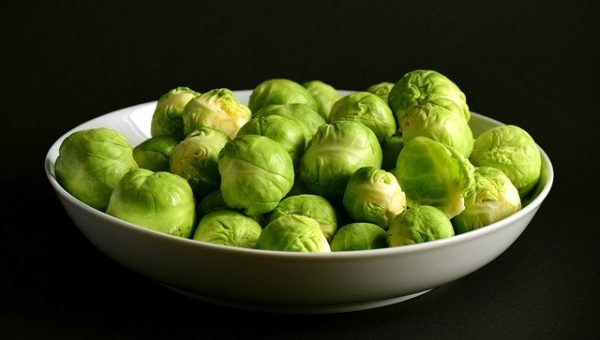 As the popularity of feeding dogs more vegetarian-based meals grows, the questions undoubtedly begin to arise; what vegetables are safe for my dog to eat? Which ones should I avoid feeding my dog ?
As the popularity of feeding dogs more vegetarian-based meals grows, the questions undoubtedly begin to arise; what vegetables are safe for my dog to eat? Which ones should I avoid feeding my dog ?
As with all new foods being introduced to your dog, you should always consider moderation, and to keep track of how well they are tolerating the food. If they aren’t allergic to the vegetable, and seem to be adjusting to it well, there are a multitude of benefits to be seen from your dogs Brussels sprouts and vegetable consumption!
Dogs are omnivores, able to eat both plant and meat material. As feeding them meat has been more traditional, meat alone leaves a lot to be desired, missing some essential vitamins, fiber and nutrients that could improve your dog’s quality of life.
Why Brussel Sprouts and Veggies Are Healthy For Your Dog
Brussel Sprouts are rich in Vitamins B, C and K, as well as being loaded with dietary fiber. The fiber, along with Manganese and other minerals, will help improve your dogs gastrointestinal and digestive processes. Brussels sprouts may cause your dog to exert a lot of gas in the gastrointestinal clearing process, so watch out for that smelly side effect, and be sure to feed in moderation to reduce this !
A key mineral found in Brussels sprouts called Sulforaphane is known and proven to deter obesity, lower cholesterol, act as an antioxidant and even help fight off cancer!
Various vegetables contain high amounts of A, B, C, E and K vitamins that can act as powerful antioxidants and improve their immune system and digestive processes, supplementing some of the vitamins that dogs naturally synthesize themselves. Some of these vitamins are missing from meat-based meals, and a deficiency can lead to future health issues.
In addition, many vegetables are rich with Potassium, Calcium and Omega-3 Fats, which are all minerals crucial to the proper functioning of both dogs and humans, supporting muscle growth, bone growth and heart health.
Proper Brussels Sprouts Serving
When deciding which way to prepare for your dogs brussels sprouts consumption, the process of either steaming or microwaving them should work just fine. Both of these processes preserve the nutrients in them. Never feed them just raw vegetables!
As mentioned, always remember to feed in moderation, keeping note of your dog’s reaction to the food concerning their eating and bowel movement habits.
If your dog is being introduced to it for the first time, perhaps just start out with chopped up quantities of around a quarter sprout. As your dog eats more brussels sprouts, this amount can periodically increase, but not too far beyond a full sprout at most.
Which Veggies Can I Feed My Dog ?
There are tons of veggies out there that are safe for your dogs consumption! Serving these veggies in considerate and rationed amounts will undoubtedly help your dog reap the potential benefits that veggies offer. These include, but are not limited to;
- Cucumbers
- Broccoli
- Brussels Sprouts
- Carrots
- Green Beans
- Sweet Potatoes
All of these veggies are rich in vitamins and minerals. Always be sure to chop the veggies into pieces, such as cucumbers and broccoli, in order to reduce the potential choking hazard. In all, cutting the veggies into smaller pieces and quantities ensures that your dog doesn’t eat a lot at once, or too much; two things that can leave them with an upset stomach.
Veggies To Avoid !
As some of these veggies sound too good to be true concerning their health benefits, there are some that your dog should more than certainly avoid, due to toxicity and inability to process some of these veggies. These include, but are not limited to;
- Raw Potato
- Onions
- Garlic
- Mushrooms
- Tomatoes
So, YES! Brussels Sprouts and Other Veggies ARE Safe For Your Dog !
Now with the knowledge of some veggies that are good for your dog and some that are not, it is time to help your dog realize the benefits of vegetable consumption from their responsible owner by feeding them in healthy, considerate amounts!
Sources
Fitzsimmons, Paula. “Ask a Vet Online for Free, 24/7.” PetCoach, www.petcoach.co/article/new-dog-survival-guide-feeding-tips/.
Flowers, Amy. “Should Dogs Eat Vegetables?” WebMD, WebMD, 5 May 2019, pets.webmd.com/dogs/do-dogs-need-veggies#1.
Knight, Andrew, and Madelaine Leitsberger. “Vegetarian versus Meat-Based Diets for Companion Animals.” MDPI, Multidisciplinary Digital Publishing Institute, 21 Sept. 2016, www.mdpi.com/2076-2615/6/9/57/htm.
Sanderson, et. al. “Nutritional Requirements and Related Diseases of Small Animals” Merck Veterinary Manual, https://www.merckvetmanual.com/management-and-nutrition/nutrition-small-animals/nutritional-requirements-and-related-diseases-of-small-animals?network=g&matchtype=p&keyword=nutrition%20for%20dogs&creative=223890071248&device=c&devicemodel=&placement=&position=1o2&campaignid=939309340&adgroupid=50856315830&loc_physical_ms=9033319&loc_interest_ms=&gclid=Cj0KCQjwgNXtBRC6ARIsAIPP7Rv7EAhVUGc0IThF50Iln2d_FZRPKkIt9n6tI6oYcG_ARV85NKeb_w8aAtYDEALw_wcB
“Toxic and Dangerous Foods Your Dog Should Never Eat.” WebMD, WebMD, pets.webmd.com/dogs/ss/slideshow-foods-your-dog-should-never-eat.
“Why Is Potassium Important For Dogs?” Barking Royalty, 8 Feb. 2019, barkingroyalty.com/why-is-potassium-important-for-dogs/.

Hi, I am Andrew. I am the editor at FamilyWithPets. I am enjoy learning and sharing information about pets that helps enrich the lives of pets and pet parents.
